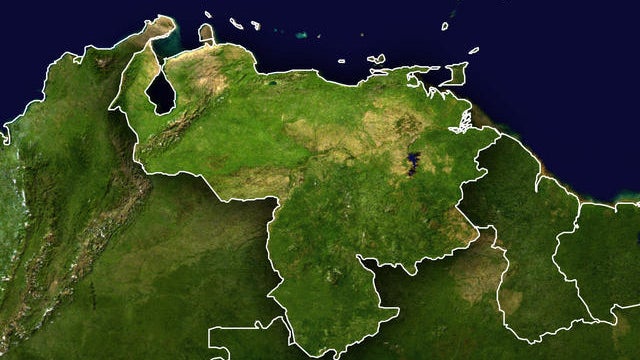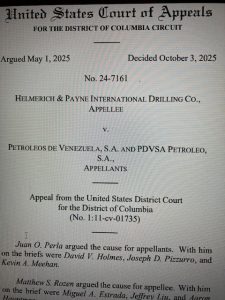
A U.S. Court of Appeals ruled in support of Tulsa-based Helmerich & Payne in a fight dating back 15 years when Venezuela seized at gunpoint control of eleven of the company’s oil drilling rigs in the South American country.
The Court of Appeals for the District of Columbia upheld a district court’s rejection of the claims of Petroleos De Venezuela, S.A. which the court determined to be a subsidiary of Venezuela. The seizure of the eleven oil rigs stemmed from a dispute over late payments byPDVSA which is a Venezueland energy copany wholly owned by the Bolivarian Republic of Venezuela. For decades, helmerich provided services to PDVSA.
“Helmerich (Venezuela) owned various property in Venezuela,
including large rigs suitable for drilling oil and gas wells there.
In the early 2000s, the relationship between Helmerich
(Venezuela) and PDVSA soured. PDVSA began defaulting on
its contractual obligations to Helmerich (Venezuela), racking
up some $90 million in unpaid invoices for drilling services. In
2009, Helmerich announced that it would wind down its
Venezuelan operations, and Helmerich (Venezuela) began to
disassemble its rigs,” cited Appeals Court Judge Greg Katsas in explaining the history of the fight.

At the time, Venezuela defended its actions. Announcing the takeover of the rigs Rafael Ramirez, the Venezuelan oil minister, said companies that refused to put their rigs into production were part of a plan to weaken Chavez’s government.
When PDVSA seized or “expropriated” Helmerich & Payne’s assets, the Oklahoma energy company sued in the U.S. and invoked an expropriation exception to foreign sovereign immunity.

“PDVSA employees and the Venezuelan National Guard blockaded the drilling operations of Helmerich (Venezuela) to prevent removal of the rigs. PDVSA issued press releases claiming to have “nationalized 11 drilling rigs” belonging to Helmerich
(Venezuela), which it said would henceforth be “operated by
PDVSA as a company of all Venezuelans.” J.A. at 50, 54. A
PDVSA official confirmed that “[t]he workers are guarding the
drills.” Id. at 51.,” according to the court.
“We agree with the district court that the expropriation
exception applies because (1) Venezuela indirectly took
Helmerich’s property in violation of international law, (2)
PDVSA owns and operates that property, and (3) PDVSA
engages in commercial activity in the United States,” stated the District of Columbia Appeals Court in its decision.
The court fight was over what is known as the Second Hickenlooper Amendment which was created by Congress in 1964 and prohibited U.S. courts from applying the act of state doctrine to cases involving the expropriation of U.S.-owned property by foreign governments in violation of international law, allowing for claims to be heard on their merits. The amendment was passed to counter a U.S. Supreme Court ruling which applied the act of state doctrine to prevent U.S. courts from adjudicating claims based on foreign expropriations, even if the expropriations violated international law.
As a result of Hickenlooper, U.S. courts were allowed to hear cases where firms such as Helmerich & Payne claimed title to or a right to property based on foreign confiscation such as occurred in Venezuela, which violated international law.
In the original case, a district court denied the motion by Venezuela and its state-owned energy company to dismiss the case and the U.S. Court of Appeals for the District of Columbia Circuit initially affirmed. The case ended up before the U.S Supreme Court which vacated the decision citing a standard for the Foreign Sovereign Immunities Act (FSIA expropriation exception. But on remand, the D.C. Circuit found only the U.S. parent company had a valid claim under international law and the district court dismissed Venezuela as a defendant, leaving only its state-owned company as the sole defendant.
On appeal, the United States Court of Appeals for the District of Columbia Circuit affirmed the district court’s denial of the state-owned company’s motion to dismiss. The court held that the FSIA’s expropriation exception applied because Venezuela indirectly expropriated the U.S. company’s property, the state-owned company owns and operates the expropriated assets, and it engages in commercial activity in the United States.
The court also held that personal jurisdiction was proper and that the act-of-state doctrine, as limited by the Second Hickenlooper Amendment, did not bar the claim.

